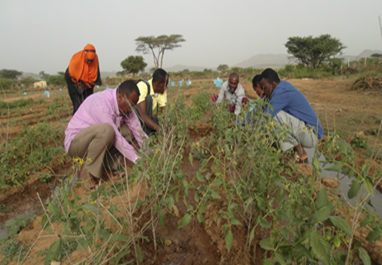
The Growth, Enterprise, Employment and Livelihoods (GEEL)
The Growth, Enterprise, Employment and Livelihoods (GEEL) program promotes inclusive economic growth throughout Somalia. Through GEEL, USAID will accelerate Somalia’s growing integration into the global economy through a combination of initiatives that improve the country’s competiveness; spur new investments; and increase market linkages and business partnerships. This program will boost Somali exports of quality agriculture, fish, and non-pastoral livestock products; reduce reliance on inputs; and increase jobs in regions recovering from years of conflict and recent natural disasters.
GEEL will leverage the growing capacities of the government at the federal, regional, and local levels that are building an environment ready for economic growth. Activities will focus on sectors with high potential in Puntland, Somaliland, and existing and emerging federal states, including regions previously inaccessible due to insecurity.
ACTIVITY AREAS
GEEL activities are divided into two broad categories – activities focused on priority economic sectors, and activities that address challenges and opportunities that are common among multiple sectors.
GEEL prioritizes activity sectors from within the broad areas of agriculture, fish, and non-pastoral livestock products. It strengthens the startup and expansion of small and medium-sized businesses, with an emphasis on including women, youth, and other disadvantaged groups as part of the economic development process. The program builds the capacity of internal investors as well as the Somali diaspora eager to invest in business opportunities.
A “competiveness” approach illuminates the common interests that Somalis have in working together in the sectors to succeed internationally, and identifies the specific actions that the private sector and government need to take for the country to become increasingly competitive. Priority interventions will include attracting capital investment to create new businesses and expand existing businesses; introducing advanced technologies to improve efficiency; and increasing the ability of agribusiness and fisheries to comply with internationally accepted food, health and hygiene regulations for the export market.
Addressing challenges and opportunities that span multiple sectors will reduce economy-wide barriers to economic growth that affect all sectors and industries, and businesses of all sizes. For example, access to affordable and reliable sources of energy is a major constraint to all businesses that can be addressed by investing in renewable energy technologies. These activities are expected to promote competition in Somalia’s economy and focus on startup firms, SMEs and women and youth-owned businesses. Likewise, investments in the policy environment will help make the operating environment more transparent.
GEEL encourages many players in the private sector to collaborate in new ways with each other and with federal and other government counterparts. They may be food processors, investors in boat-building, refrigeration and transport services, financial institutions and university faculty, to name a few. Activities may include introducing efficient irrigation systems; pioneering an export crop; constructing small –scale infrastructure projects such as irrigation canals, access roads and fish landing-piers; or training technicians on solar and wind power technology.
USAID currently has two notable related programs on the ground in Somalia: the Strengthening Somali Governance (SSG) and the Transition Initiatives for Stabilization + (TIS+). Bridging with SSG and TIS+, GEEL will leverage the strong federal and local government relationships and community ties already gained over the past five years, and build on their current activities that have proven to be successful to expedite economic growth.
ANTICIPATED ACTIVITY IMPACT
- Introduction of 40 new or more efficient technologies
- Increased production/volumes by at least 50% of commodities targeted
- Facilitation of at least 20 new private agribusiness investments, resulting in at least $500,000 of private funds invested in each
- Creation of a minimum of 5,000 new jobs that provide at least a year’s worth of income, 30% of which are for women
- 30 critical small-scale civil works that improve economic infrastructure








Comment
Make a general inquiry or suggest an improvement.